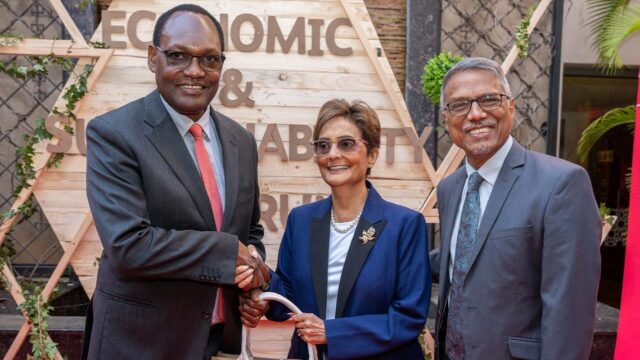DTB forecasts loan surge for Kenyan SMEs and individuals as economy recovers
Individuals and small businesses will feel the immediate impact of the recovery of the economy.

Diamond Trust Bank (DTB) has forecast an increase in lending to individuals and small businesses as Kenya’s economy stabilises and growth becomes steady after the difficult times encountered last year.
DTB Kenya Chief Executive Officer Murali Natarajan said the banking sector’s credit is also likely to double in the next decade from the current $32 billion if the current momentum is maintained.
Speaking at the DTB Economic and Sustainability Forum in Nairobi, Mr Natarajan said the immediate impact will be felt by individuals and small businesses.
“When I look at the resilience of the economy and the track record of having dealt with so many challenges, that gives me immense confidence that I feel very confident about going forward,” said Mr Natarajan.
“When I look at the MSME segment, which is partly informal and partly formal, going forward and as banks start focusing on retail and SMEs, I feel that there is a big opportunity there. Working with our team, with the guidance of the board and the Group CEO, we are pretty confident that focusing on the segments, like agriculture, retail, MSME and making it more small ticket and mass, we should be able to double our balance sheet in about three to four years,” Mr Natarajan added.
He said this would entail more focus on the Bank’s digital offerings, partnerships and increasing the number of branches to reach more customers.
Mr Natarajan said his forecast is supported by the stability of the Kenyan economy following interventions to reduce interest rates, the effect of plentiful rains, and the reduction of fuel prices.
“I congratulate the Government and the Central Bank of Kenya for steering the ship through difficult times last year. The macros look stable, interest rates are coming down, and the flow of remittances from Kenyans abroad continues,” said Mr Natarajan.
DTB projects economic growth at 5 per cent this year, but with challenges and risks to remain.
Dr Chris Kiptoo, the Principal Secretary for the National Treasury, said he is optimistic that the current momentum will continue.
“When I started, it was very hard, and I had many sleepless nights. Now, the worst is over, but the future is brighter. We have a resilient economy, diversified, and that’s how we come out of shocks,” said Dr Kiptoo.
Dr Kiptoo said the focus for the Budget in the next financial year would be on agriculture, exports of tea, edible oil, cotton, leather, dairy, natural resources, building materials, and the blue economy.
To boost lending to the private sector, said Dr Kiptoo, the Credit Guarantee Scheme would be transferred to a government-owned company to keep it going. The Credit Guarantee is currently an arrangement between the government and seven banks where the Government commits to pay a portion of the outstanding amount in the case of a default.
Dr Kiptoo said the committee verifying pending bills has so far approved the payout of KSh236 billion of the more than KSh600 billion when the Kenya Kwanza administration took over. Of this, he said, the bulk would go to small businesses that are suppliers and to road contractors.
The Principal Secretary said Kenya would continue to be in the International Monetary Fund programme to maintain stability.
The implementation of the Single Treasury Account, e-procurement policy, zero-based budgeting, and working with Public-Private Partnerships would be prioritised as the Government looks to increase spending on development.
